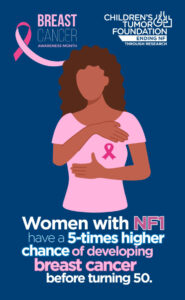If you or someone you love has neurofibromatosis type 1 (NF1), it’s essential to know that this condition can significantly increase the risk of developing breast cancer at a younger age.
What is NF1?
NF1 is a genetic condition that affects about 1 in 2,500 births. NF1 is often diagnosed in childhood, with signs like café-au-lait spots on the skin and benign tumors along the nerves called neurofibromas. As people with NF1 age, there are increased risks for certain types of cancer, including a higher risk of breast cancer for women with NF1 as compared to those without NF1.
How High is the Risk?
- Before Age 50: Women with NF1 have a 5 times higher chance of developing breast cancer before turning 50.
- Beyond Age 50: The overall risk for women with NF1 of developing breast cancer after the age of 50 remains significantly elevated at 3.5 times higher than that of women without NF1.
What Makes NF1-Related Breast Cancer Different?
Breast cancers in women with NF1 often have a less favorable prognosis. This is partly because these cancers are more likely to be hormone receptor-negative, meaning they don’t respond to hormonal therapies that can be effective in other types of breast cancer.
What Can You Do?
The good news is that early detection through regular screening can make a difference. Here’s what current guidelines recommend:
- Start Screening Early: For women with NF1, annual mammograms should begin at age 30. This is earlier than the general population, where routine mammograms typically start at age 40. If a family member had breast cancer before age 40, women with NF1 should consider starting mammograms 10 years before the youngest age of diagnosis in the family.
- Consider Additional Screening: From ages 30 to 50, it may be wise to add breast MRI with contrast to your annual screening routine. MRIs can sometimes detect cancers that mammograms miss, especially in younger women with dense breast tissue.
- Talk to Your Doctor: If you have NF1, it’s crucial to have open conversations with your healthcare provider about your breast cancer risk. Make sure you understand the screening options available to you and follow the recommended guidelines closely.
- Stay Informed: Research has shown that not enough women with NF1 are getting the recommended MRI screenings. This might be due to a lack of awareness among patients and doctors. Being informed and advocating for yourself can help you get the needed care.
Conclusion
While NF1 increases the risk of breast cancer, understanding this risk and taking the right steps can help identify potential issues early, which provides the most options for effective treatment. The keys to supporting breast health are regular mammogram screenings starting at age 30 and considering supplemental breast MRI screenings. Be sure to speak with your healthcare providers to ensure that they are aware of these recommendations and that you’re doing everything you can to protect your health.
Our thanks to Amanda Bergner, MS, LCGC, for reviewing this article. She is a Professor of Genetic Counseling at Columbia University Irving Medical Center, the genetic counselor for the Columbia University NF Center, and the founding Director of the Columbia University Program in Genetic Counseling.
References:
Yan, K., Gao, Y., & Heller, S. L. (2023). Breast Cancer Screening Utilization and Outcomes in Women With Neurofibromatosis Type 1. Clinical breast cancer, 23(4), e200–e205. https://doi.org/10.1016/j.clbc.2023.02.005
Suarez-Kelly, L. P., Yu, L., Kline, D., Schneider, E. B., Agnese, D. M., & Carson, W. E. (2019). Increased breast cancer risk in women with neurofibromatosis type 1: a meta-analysis and systematic review of the literature. Hereditary cancer in clinical practice, 17, 12. https://doi.org/10.1186/s13053-019-0110-z
Madanikia SA, Bergner A, Ye X, Blakeley JO. Increased risk of breast cancer in women with NF1. Am J Med Genet A. 2012 Dec;158A(12):3056-60. doi: 10.1002/ajmg.a.35550. Epub 2012 Nov 19. PMID: 23165953; PMCID: PMC3507419.


